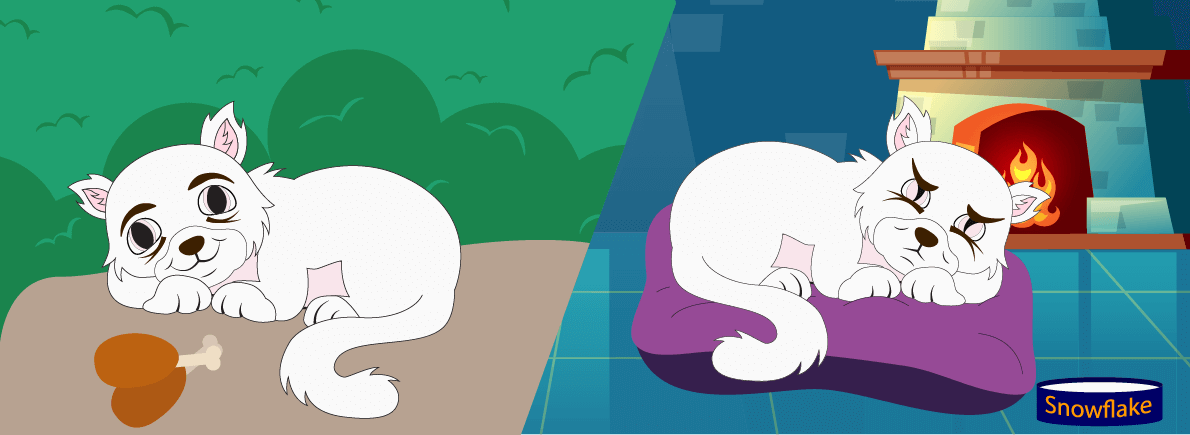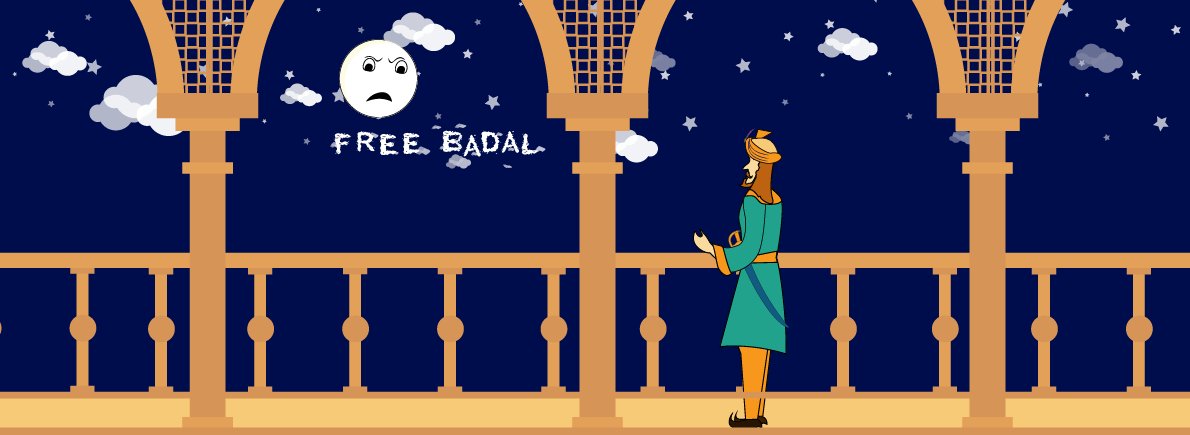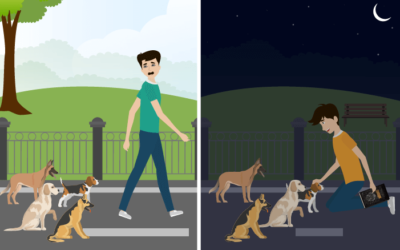Fiction
Pushpi And The Anti-Adoption Squad
Lalita Iyer
Most parents want to fulfil their children’s wishes and often give in to their demands- a desire for a pet animal often being one. However, have you given any thought to whether or not an animal would enjoy being domesticated? We should think of what animals want just as much as we would of what our children want. In this elaborate tale, Lalita conveys what a domesticated animal might be feeling. By reading this piece of original fiction, we hope people realise that adopting animals is not always the best for the animal, and think twice before doing it, no matter how much their children may want it.

(Some elements of this work have been designed by Vectorpocket)
Pushpi was very worried. Her team had just told her about Paromati, the princess who was in search of a newborn kitten. “An all-white one would be preferred. The princess is really missing her palace in Jaipur and would love to cuddle with a little furry ball. Finders will be suitably rewarded,” the notice had said. It seems Paromati’s mother, Queen Padmavati had issued the notice, and it was sent to all the neighbouring villages in the kingdom. She was on the lookout, high and low, for a kitten to please her daughter and had instructed all the guards of the palace to go on the prowl. If they found a suitable kitten, they were to bring it to her immediately.
Pushpi saw the notice pasted on a tree that she was trying to climb. She read it twice to make sure it was what it said. She was a calico cat, all of seven, but wise beyond her years. That is why the cat committee elected her to safeguard cat interests. She had set up the AAS, or the Anti Adoption Squad which kept tabs on people who adopted animals on a whim. She knew of humans and their flighty desires. One day they would be all excited about adopting an animal and the next thing you know, they would have abandoned them somewhere in a jungle, or on the road, because they couldn’t look after them or they were moving houses or they married someone who didn’t like animals or they were having babies of their own or worse, the animal fell ill and couldn’t entertain them like it used to.
What they actually did was uproot a perfectly happy animal (usually a cat or a dog), who was happily basking in the wilderness, to take it to their dreary homes where the animal was fondled and petted excessively for the first few days by all and sundry, overfed on some nonsense like milk and bread or some such rubbish, and after a few days, when they realised adopting an animal was as intense as looking after a baby, it was left to fend for itself. Also, somehow, humans never seemed to be aware of the fact that animals grow up pretty fast and often don’t like being picked up or fondled all the time, much like human babies.
____________________________________
She knew one thing. People who said they were cat-people or dog-people were not really animal people. They liked animals only when it suited them. Animals also made them look good, as they were often prettier and more elegant than the gauche morons they wanted to marry. Pushpi remembered the last time someone took a cat home. The man, Chandu, lived in an apartment in Bombay and wanted a kitten because he was lonely. He also thought having a cat would perhaps draw girls closer to him as he was otherwise quite boring and had no personality. They might think he is sensitive and caring and would perhaps go out with him, and who knows, even marry him. He claimed to be a cat lover and often stroked cats whenever he passed them by and they didn’t seem to mind.
The cat, Chinka was a little black and white kitten who had just lost his mother and the grocer, Prafulbhai, whose shop he used to sleep in, was worried for him. He was busy at the shop all day and had no time to go running after Chinka, so was hoping to find him a home. Chandu lived in the apartment block a few yards from the grocer and often came to him to buy bread, milk and other things. He instantly took a liking to Chinka and asked the grocer if he could take him home.
It started off pretty well, with Chandu feeding Chinka four times a day. Chinka got used to just lolling about, since there were no birds or mice to chase and food was freely available. Soon, Chandu had to go to work, so he would leave home in the morning and return late night, and very often, Chinka would have messed up the house as he was used to doing his job in the wilderness and didn’t really know how to use a toilet. This made Chandu angry and he started leaving him out of the house. A few days later, the building society members were complaining that Chinka was stealing their milk packets and looking into their garbage. This made Chandu even more annoyed and he complained to the grocer what a badly behaved cat Chinka was. It’s only then that the AAS realised this Chandu would forget to feed Chinka most nights as he always returned home drunk. After waiting the entire day for food, Chinka would often sleep hungry or look for scraps here and there and hence the milk packets that came in in the early morning were tempting.
One day, it seems the secretary of the building was fed up of the constant complaints and asked some kids in the society to get rid of Chinka, so they put him in a sack and took him far away into Sanjay Gandhi National Park where they were told evil people always abandoned animals. Chinka was never to be found again and Pushpita cursed herself for not stepping in earlier.
____________________________________
Which is why Maharani Padmavati’s notice really bothered Pushpi and she immediately sent her team to alert the neighbouring villages to guard their stray cats, particularly if they were all-white. But such was the power of Padmavati’s notices that one of her team members came back reporting that a certain white kitten had already been picked up by some royal guards and was on his way to the palace on the hill. Pushpi was most upset.
The kitten, whose name was Badal, had no idea what was happening, but he did seem to think it odd that the men who picked him up were now getting on a jeep which drove a few miles and then suddenly started climbing uphill. When Badal turned to look, he could see his village in the far distance and started wondering what was going on. Soon they entered the palace gates and Badal was handed over to Maharani Padmavati who ordered her maids to give Badal a nice bath before taking him to the princess’s chambers. The bath part freaked out Badal as he had never experienced something so horrific before. Imagine being dunked in water over and over again, and some funny thing that forms bubbles scrubbed all over you. Disgusting, he thought. Little did he know that worse was yet to come.
He was renamed Snowflake by that annoying princess who kept giggling over and over again in her squeaky voice. He hated the name, it sounded so girly and he felt like someone else, and suddenly missed his real name, Badal. It meant cloud and he felt like one every time his earlier master called him. He missed his master and wondered how he was doing. He grew and sold onions in the village of Gundalwadi and Badal was his only companion.
The first thing Snowflake noticed was that the palace was strictly vegetarian and all he got to eat was chapati or curd rice. And of course, milk, which flowed like water. But what on earth is curd rice, he thought. What self-respecting cat eats that? At least in the village, he occasionally had access to some chicken legs discarded by the dhaba or he would kill a bird or a squirrel and feast on it. Life was good. Plus, hadn’t some scientist proved that taurine, the amino acid only found in meat, was really important for cats?
Whenever he managed to kill a pigeon or a lizard and proudly present it to Princess Paromati, she let out a shriek that sounded most unsettling and disturbing and he reluctantly had to let go of his prized catch. Now there was some cat in the neighborhood that was on heat and Snowflake wanted to chase her. But they kept shooing her away because she was a black cat and the palace people thought she would bring bad luck or some such thing.
He was most annoyed with his life. He wanted out, but all eyes were on him, as he was the princess’s pet toy, so he couldn’t even slip away without being noticed. What to do? It’s just then that he remembered the AAS. He had to send a message to Pushpi and he wondered how.

He remembered Champak, the pigeon who landed at the palace courtyard every day for the seeds the princess would fling. He knew Champak was a free bird who flew back to Gundalwadi every evening where he would meet Pushpi. He bit off a claw of his that was loose, wrapped it in a leaf and handed it to Champak, asking him to give it to Pushpi. The claw was delivered the next morning and instantly Pushpi knew her hunch was right. It was operation rescue time. But Pushpi knew she needed a master plan to break into the palace. “Just breaking Badal out won’t do. We have to teach these humans a lesson”, said Pushpi to her team.
“But how can we? They will outnumber us. Plus, they have sticks and stones and other things they hit animals with”, said Bijlee, Badal’s sister, who had now joined the AAS.
“Remember the Pied Piper of Hamelin? Remember how he took an entire population of rats out of a town? If he can, we can!”
“Rats? Are you sure?” asked Bijli.
“Yes. We need to find some rats. A lot of rats”, said Pushpi. “And a Pied Piper.“
“But why rats?” piped someone from the team.
“Because humans are scared of them. They find them repulsive, and they would be embarrassed to have them around when guests visit them. A thousand rats is a scarier procession than a hundred cats, and will definitely teach them a lesson.”
“Oh, I know a few rats”, said Chinki from the team, “last time I slept at that Samrat restaurant, I met quite a few. They even shared their food with me. And my cousin knows a Pied Piper.”
They found Bansi who played the bansi exquisitely. It seems Bansi was often summoned at Naag Panchmi whenever the snake charmers couldn’t woo the snakes out of their baskets. Bansi always could.
So they made a master plan. They would form a cat chain followed by a rat chain and climb on the palace walls on an appointed day. Bansi would also stir up all the animals on the palace grounds into a protest march. If humans can, animals can too, right? So all the parrots and lovebirds in cages, the palace peacocks, dogs, the rabbits, the squirrels, the toads, the millipedes, the earthworms, the babblers, the cows, the sparrows, the crows, every non-human who was part of the palace ecosystem and was constantly being bothered by humans would be whisked away.
The chosen night was the following Friday, which was Princess Paromati’s birthday. There was a grand celebration planned, and the queen proclaimed there would be a grand feast and had invited royalty from the neighbouring village (this was also, Pushpi suspected, a ploy to check out the princes from those kingdoms and find a suitable match for Paromati).
That would be a good night to attack. The palace people would be all graceful and charming, trying to impress their hosts and trying to look good. The queen had made all the arrangements. The swans were to be released in the pond in the centre of the courtyard at the opportune time, and in the palace gardens a dozen peacocks were to perform a splendid dance to entertain the guests.
The evening finally arrived. The palace was all done up like a new bride would be and guests were being welcomed with a shower of rose petals and marigolds and the sounds of the shehnai. The princess was sitting poised by the pond in a resplendent jhoola, stroking Snowflake.
Slowly an army of cats and mice made its way over the palace walls and took up position at various corners. Pushpi had asked all of them to wait for a signal from her. When she knew all thousand rats and a hundred cats were in, she whistled and said “Now!”, and Bansi began playing his bansi for all the animals to hear.
It was a scramble. The peacocks stopped dancing midway and followed the army of cats and rats. The swans and ducks scrambled out of the lake and lined up behind them. The toads, millipedes, squirrels and snakes soon followed. Next in line were the butterflies, grasshoppers, beetles and moths. In all the ensuing chaos, Snowflake slipped away.
The king was flabbergasted. The queen squealed as she couldn’t open her windows due to a swarm of babblers attacking it and when she went to her bathroom to get away from it, there was a mini mountain of toads in her royal bath. “Do something!” she screamed to the king. The king was running out of ideas. His army was prepared for an enemy attack, but this! What does one do with an animal kingdom attack? He called his royal commander in chief anyway.
“Sir, there’s not much we can do. Also, most of my men can shoot deer and other game animals, but what do we do about rats, toad, etc. I would suggest you find some sort of animal whisperer. Only he can help you.”
Where would the king find such a person? He was despondent.
He came to his balcony with much trepidation, and looked up at the moon and said, “Oh moon! What is this calamity upon my family? If you know a way of solving this problem, please help me.”
The moon spoke back. “Oh king, you may not know this, but the animals in your palace are very cross with you and this is their way of saying it. If you are willing to let them be, I can do something.”
And then the king saw a spectacular sight in the sky. “FREE BADAL” the clouds had formed themselves into this message.
“I am ready for anything, Mr Moon! I am really sorry about Badal. He will be sent back right away.”
Suddenly, there was a swish and a silence, the bansi stopped playing. All the animals and birds on the palace grounds that were creating a ruckus suddenly vanished into their holes and hideouts. Even the toads in Maharani’s tub disappeared. All was clear again. It was very very late in the night though.
That night, Maharani Padmavati learnt an important lesson. Never mess with animals that don’t want to be adopted.
Leave them alone.

Lalita Iyer writes for little people and big people and the little people in big people. She talks about children’s books on Instagram @booksidaisies.
Read her articles here.



